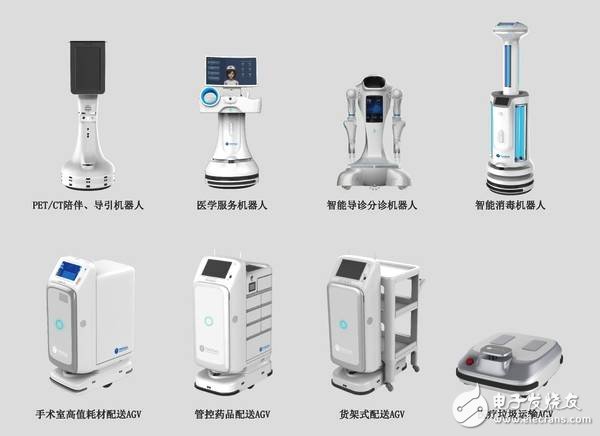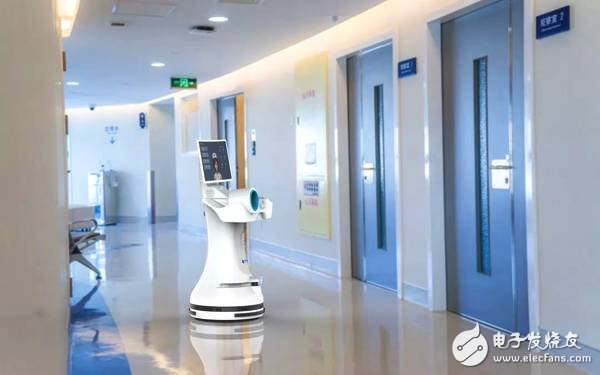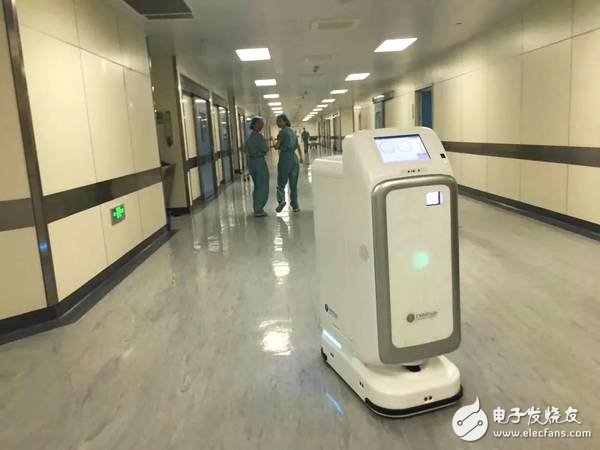In the context of the digital age, medical institutions are facing drastic changes in regulatory, economic, social and industry impacts. New market participants have gradually crossed the boundaries of the industry, using advanced technologies such as robotics, artificial intelligence, cloud computing, and the Internet of Things to challenge the large, traditional and extensive institutional management.
Among them, medical robots are using subversive innovations to gradually improve the hospital's ability to respond to major disease prevention and control and public health emergencies, maintain medical safety and order, redefine modern smart hospitals, and help medical institutions reshape their public image. Recently, Shanghai Titanium Robot Technology Co., Ltd. (hereinafter referred to as Titanium), a leader in medical service robots, officially announced the completion of a 200 million yuan B round of financing. This round of financing is led by Gimpo Investment, CDH Investment and Angel The round investor Guo Kejiahe, the round A investor IDG Capital, and Cobos Robot continued to participate in this round of financing.
The continuous follow-up of multiple investors demonstrates that capital is optimistic about the market prospects of this leading company in medical service robots.

With the continuous advancement of the medical reform policy, medical institutions are suffering from management challenges, divergent interests, lack of human resources, social interference and historical issues. The faults in goal orientation and management measures have caused the medical reform to be implemented. How to clarify the context of hospital reform and avoid blindness in action, the key is to introduce advanced scientific and technological means and market-based incentive mechanisms to participate in the top-level design, liberate the productivity of the hospital, and realize the core value.
The development and integration of digital cognitive technology represented by artificial intelligence has become an effective tool, helping to improve and promote the interaction and collaboration among decision-making levels, medical institutions, and patients. As the jewel at the top of the crown of the manufacturing industry, robots continue to expand in the application fields of modern biomedical scenarios, and have more detailed branches and applications.
In April 2018, the "Opinions on Promoting the Development of "Internet + Medical Health"" issued by the General Office of the State Council publicly supported this innovative format at the national level. The "Opinions" pointed out that it will encourage the strengthening of the integration, sharing and application of clinical and scientific research data, and support the development of medical and health-related artificial intelligence technologies, medical robots, and large-scale medical equipment. Focusing on the increasing needs of the people, using information technology to optimize service processes, improve service efficiency, and improve the matching degree of medical service supply and demand.
"Our hospitals are different from foreign countries in all aspects. Operational safety and medical safety rank first in the hospital review standards." Yu Tao, deputy dean of Renji Hospital affiliated to Shanghai Jiaotong University School of Medicine, revealed in an interview, "From' From a people-oriented perspective, robots do have broad application scenarios in hospitals, which can improve medical safety and services, help hospitals with refined management, and avoid errors."
Robots drive medical service reformA doctor is a profession that saves lives and heals the wounded, but a normal and safe practice environment is a basic prerequisite, which includes that the personal safety of the doctor must be guaranteed. In fact, due to the occupational specificity of medical staff and the limitation of treatment cognition, medical staff in some departments have to be exposed to various risk factors every day, such as various infectious diseases, various disinfectants, and radiation. , Anti-tumor drugs, etc., not only bring many problems to the internal management of the hospital, but also limit the personal development of medical staff.
For example, the nuclear ward is a typical example. It is understood that radioactive iodine 131 is an important method for the treatment of postoperative residual lesions of hyperthyroidism and thyroid cancer. After the patient takes nuclear medicine treatment drugs, his own radioactivity is enough to threaten the safety of doctors and nurses. With robots, it can replace medical staff to work in toxic and harmful environments, and be further applied to special environments such as infectious disease hospitals and high altitude hypoxia. While holding up an umbrella for medical staff, it can reduce the work intensity of medical staff.

It is understood that Titanium has defined and designed a series of operating room logistics robots, nuclear medicine service robots and disinfection robots earlier in China, becoming a pioneer in applying robotics technology to hospital segmentation scenarios and establishing an intelligent management system. Take Titanium’s nuclear medicine ward service robot as an example. It can replace the medical staff to monitor the patient’s daily body temperature, blood pressure, thyroid iodine uptake and radiation residues, etc., which not only shortens the medical staff’s monitoring cycle of patient’s vital signs , To bring more accurate and humanized services to patients undergoing radiotherapy; at the same time, it also reduces the occupational injuries of medical staff and assists in improving the level of clinical scientific research.
After trying to use the Titanium robot for one year, Gao Zairong, chief physician of the Department of Nuclear Medicine of Wuhan Union Medical College Hospital, commented, “The robot has effectively alleviated the contradiction between medical quality requirements and the safety of medical staff, while improving the quality of teaching rounds and facilitating clinical observation. And teaching."
The operating room is also a department with many emergencies and frequent clinical risk events. Not only that, the traditional extensive management loopholes of high-value consumables in operating rooms have once become a socially sensitive topic. In 2016, the "Several Opinions on Controlling the Unreasonable Growth of Medical Expenses in Public Hospitals" issued by the former National Health and Family Planning Commission clearly required that the rate of increase in medical expenses should be reduced, in fact, the implementation of zero markup for hospital medicines and equipment. However, after the release of the document, some hospitals turned away patients in urgent need of surgery on the grounds of restricting the use of high-value consumables, exposing the shortcomings of traditional high-value consumables management.
After this phenomenon was exposed, the TIMI Robotics team went to the hospital to investigate and took the lead in designing a high-value consumables and medicine distribution robot. This robot can be docked with the hospital warehouse information system (HIS) to quickly realize the connection between the operating room and the secondary warehouse. The function of ordering and automatic distribution of medicines, consumables, instruments and other materials can avoid the interruption due to waiting for transportation during the operation, and support the full cold chain transportation of special drugs such as anesthesia, and optimize the management of consumables in the operating room , Effectively solve the existing problems in the current medical system.
According to statistics, one titanium meter surgical consumables logistics robot can save the physical strength of 4 medical staff, and achieve zero error in consumable management, allowing medical staff to focus more on patient treatment.

It is understood that as a leading company in the medical service robot industry, Timi Robot has developed more than ten types of robot products, and has been in more than 30 top three hospitals across the country, such as Wuhan Xiehe, Shanghai Renji, Zhengda First Affiliated Hospital, and Anhui Province. Land use. In this B round of financing, Titanium will be used to further strengthen product development and market layout in the medical service robot industry, and promote further innovation of Titanium's core technical advantages in the field of surgical robots.
"For a long time, medical policy makers, hospital management and medical staff have been seeking how to integrate and apply advanced artificial intelligence, robotics, and Internet of Things technologies in medical scenarios; and the medical service robot system may be a satisfactory answer." Pan Jing, the founder of Titanium, introduced that whether it is an operating room logistics robot system or a nuclear medicine service robot system, Titanium is aimed at the actual needs of hospitals and transforms complex robotic technology into reliable and practical robot products. Titanium will be committed to reducing the occupational injuries of medical staff, improving the efficiency of medical management services, improving the patient experience of medical treatment, and making artificial intelligence technology truly serve people's lives.
There are already many medical service robots entrants, why did they choose Titanium? Huang Yan, managing partner of CDH Innovation and Growth Fund, said, “The medical industry is the focus of CDH’s investment layout and one of the possible breakthrough directions for artificial intelligence in the near future. CDH Investment’s focus is on Titanium’s medical service robot platform. -Type technology, rapid product deployment capabilities in medical service scenarios, and R&D capabilities in the field of high-end surgical assisted robots."
Lu Houjun, President of Jinpu Industrial Investment Fund Management Co., Ltd. also expressed his optimism about the Titanium team, "The Titanium team has its own algorithm with higher technical barriers and strong mechanical structure design capabilities, and can tap potential needs in the complex environment of the hospital. To solve actual pain points in the form of products, the entire team is full of entrepreneurial enthusiasm and has strong execution. Therefore, we believe that Titanium will become a great company in the field of medical robotics in the future."
Fire Resistant Sleeve,Fireproof Sleeves,Fire Resistant Hose Sleeve,Fire Proof Sleeve
Longkou Libo Insulating Material Co.,Ltd. , https://www.sdliboinsulation.com